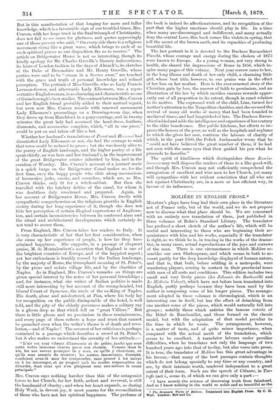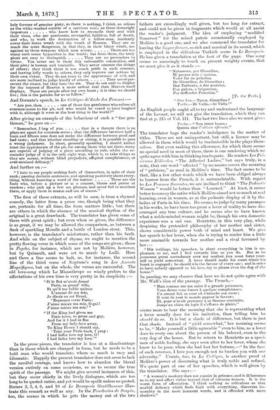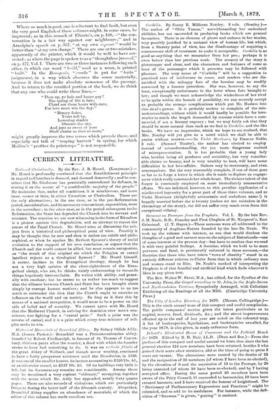MOLLtRE IN ENGLISH PROSE.*
MOLIERE'S plays have long had their own place in the literature not of France only, but of the world, and we do not propose now to discuss what that place should. be. We are concerned. with an entirely new translation of them, just published in three volumes of Bohn's Standard Library. The translator has prefixed a short sketch of the author's life, which will be useful and interesting to those who are beginning their ac- quaintance with him and his works, especially if the translator is right, as we think he is, in tracing in the works of the drama- tist, in many cases, actual reproductions of the joys and sorrows of the man. There is one circumstance in which Moliere re- sembles our own Shakespeare, and which seems in both to ac- count partly for the deep knowledge displayed of human nature, and that is, that both, before settling in a metropolis, were wandering players, coming in contact in their provincial tours with men of all sorts and conditions. This edition includes two small and very lively pieces (La jalousie du Barbouillg and. Le Modecin Volant), which have not before been translated into
partly perhaps because they have been used by the author in composing some of his longer pieces. The arrange- ment adopted in these volumes is chronological, which is an interesting one in itself, but has the effect of detaching from one another some of the pieces, which would naturally fall into groups ; notably those which satirise the famous coterie of the Hotel de Rambouillet, and those formed on the classic- model, but with the adaptation of that model peculiar to the time in which he wrote. The arrangement, however, is a matter of taste, and of quite minor importance, when compared with the actual merit of the translation, which seems to be excellent. A translator labours under peculiar difficulties, when he translates not only the language of two hundred years ago into that of to-day, but also verse into prose. It is true, the translator of Moliere has this great advantage in his favour,—that many of the best passages contain thoughts which do not belong specially to any time or any country, and are, by their intrinsic worth, rendered independent to a great extent of their form. Such are the speech of Cl4ante, in Tar- tufe (act i., scene 4), of which we can give only a part :—
"I have merely the science of discerning truth from falsehood. And as I know nothing in the world so noble and so beautiful as the
.1. The Dramatis Works of Noliere. Translated into English Prose. By C. H. Wall. London: Bell and Co.
holy fervour of genuine piety, so there is nothing, I think, so odious as the white-washed outside of a specious zeal ; as those downright impostors who know how to reconcile their zeal with their vices, who are passionate, revengeful, faithless, full of deceit, and who, to work the destruction of a fellow-man, insolently cover their fierce wrath with the wrath of Heaven They are so much the more dangerous, in that they, in their bitter wrath, use against us those weapons which men revere There are too many such mean hypocrites in the world ; but from them, the truly pious are easy to distinguish They are no pretenders to virtue. You never see in them this unbearable ostentation, and their piety is human and tractable. They never censure the doings of others ; they think there is too much pride in such censure, and leaving lofty words to others, they only reprove our actions by their own virtue. They do not trust to the appearance of evil, and
are more inclined to judge kindly of others They never per- secute the sinner, but they hate the sin. They do not care to display for the interest of Heaven a more ardent zeal than Heaven itself displays. These are people after my own heart ; it is thus we should live; this is the pattern for us to follow."
And Dorante's speech, in La Critique de'Ecole des Femmes :— "Are yon, then one of those fine gentlemen who refuse all
common-sense to the pit, and who would be vexed to have laughed with it, although it were at the best thing in the world ?"
After giving an example of the behaviour of such a "fine gen- tleman," he goes on :—
" Remember, I beg of you that in a theatre there is no
place set apart for common-sense; that the difference between half a lonis and fifteen sous does not make the difference between good and bad taste; and that whether standing or sitting, it is possible to pass a wrong judgment. In short, generally speaking, I should rather trust the approbation of the pit, for among those who are there, many are capable of judging of a piece according to rule, whilst the re- mainder judge of it in the only right way, which is, to take things as they are meant, without blind prejudices, affepted complaisance, or over-strained delicacy."
And further on :— "I hate to see people making fools of themselves, in spite of their rank; passing decisive sentences, and speaking positively about every-
thing, without knowing a word of the matter These are the fools who, before a picture or at a concert, blame and praise at random ; who pick up a few art phrases, and never fail to mutilate them, or apply them in season and out of season."
The first of these extracts, as will be seen, is from a rhymed comedy, the latter from a prose one, though being what they are, portraits for all time, the form matters little ; but there are others in which the absence of the musical rhythm of the original is a great drawback. The translator has given some of these with great spirit ; but even when so given, the difference is as great, if we may be allowed the comparison, as between a flask of sparkling Moselle and a bottle of London stout. This, however, is the translator's misfortune, rather than his fault. And while on the subject of rhyme, we ought to mention the pretty flowing verse in which some of the songs are given ; those in Psyche, for instance, which are not by Moliere, however, but by Quinault, and were set to music by Lulli. Here and there a line seems to halt, as, for instance, the second line of the third verse of Neptune's song in Les Antants Magnifiques, but on the whole, the verses are successful. The old love-song which Le Misanthrope so wisely prefers to the affectations of his own time is very pretty in its simplicity :—
" Si le Roi m'avoit donne Paris, sa grand' ville, Et qu'il me falltit quitter L'amour de ma rale, Je dirois an roi Henri,
Reprenez votre Paris : J'aime mieux ma raie, 0 gal! J'aime miens ma mie.' " "If the King had given me Paris town, so great and gay, And for it I had to flee From my lady-love away, To King Henry I should say, Take your Paris back, I pray : I had liefer love my love, 0! I had liefer love my love."
In the prose pieces, the translator is less at a disadvantage than in those which are changed in form, but he needs to be a bold man who would translate, where so much is racy and idiomatic. Happily the present translator does not seem to lack the needful courage, and knows how to abandon the literal version entirely on some occasions, so as to secure the true spirit of the passage. We might give several instances of this, but they occur chiefly in the lively dialogues, which are too long to be quoted entire, and yet would be spoilt unless so quoted.
Scenes 2, 3, 4, 9, and 10 of Le Bourgeois Gentilhonme illus- trate this remark as well as any. In the Fourberies de Scapin,
too, the scenes in which he gets the money out of the two fathers are exceedingly well given, but too long for extract, and could not be given in fragments which would at all assist the reader's judgment. The idea of employing "modified Somerset" for the mixed patois occasionally employed by Moliere is a good one, and we also commend the translator for leaving the linguafranca, so rich and musical in its sound, which is employed in the ridiculous Turkish scene in Le Bourgeois. He has given a translation at the foot of the page. One song seems so amusingly to touch on present weighty events, that we must give it as it stands :—
" Mahameta, per Giourdina, Mi pregar sera e matina.
Voler far tin paladina Be Giourdina, de Giourdina ; Dar Turbanta, e dar scarrina, Con galera, e brigantine, Per deffender Palestina." [To the Turks.]
"Star bon.—Turea, Giourdina?
Turks.—Ili Valla,—hi Vella!"
As English people ought all to try and understand the language of the Levant, we will not give the translation, which they can
find at p. 215 of Vol. III. The last two lines also we must give :
Turks.—" Non tener honta ; Questa star 1' ultimo affronta."
The translator begs the reader's indulgence in the matter of titles. These are not unimportant, but still, a licence may be allowed in them which would be inadmissible in the plays them- selves. But even making this allowance, for which there seems no special need in most of them, there is one rendering which we quite agree with him in thinking inadequate. He renders Les Pre- cieuses Ridicules, "The Affected Ladies," but says truly, in a note, that our word " affected " by no means covers the meaning of " precieux," as used in Moliere's time. The fact seems to be that, like a few other words which we have been obliged always to borrow from the French, it is untranslatable. With regard to Les Femmes Savautes, we are inclined to think "The Pedantic Women" would be better than "Learned." At least, it seems better to convey the satire which Afoliere aimed not so much at real learning, even in women, as at the pedantic display of it by the ladies of Paris in his time. He seems, to judge by many passages in his works, to have been too great a lover of reality to have dis- couraged any true culture, and he seems also to have known what a noble-minded woman might be, though his own domestic experience was a sad one. Henriette, in this very play, while despising the pretended philosophy of her mother and sister, shows considerable power both of mind and heart. We give her speech to her lover, when she is trying to render him a little more amenable towards her mother and a rival favoured by her :—
" His writings, his speeches, in short everything in him is un- pleasant to me, and I feel towards him as you do. But as he possesses great ascendancy over my mother, you must force your- self to yield somewhat. A lover should make his court where his heart is engaged ; he should win the favour of every one ; and in order to have nobody opposed to his love, try to please even the dog of the house."
In passing, we may observe that here we do not quite agree with Mr. Wall's idea of the passage. The French,— " Mais comme sur ma mere il a grande puissance, Vous devez vous forcer a quelque complaisance. Un amant fait sa cour oh s'attache son occur; II vent de tout le monde gagner la faveur ; Et, pour n'avoir personne a sa flamme contraire, Jusqu'au chien du logis il s'efforce de plaire," seems more to bear the meaning that she is representing what a lover usually does for his imitation, than telling him he
should do so. It is but a shade of difference, but there is just that shade. Instead of "yield somewhat," her meaning seems to be, "Make yourself a little agreeable" even to him, as a lover does to every one about the person of his beloved, even to the very dog of the house. But to return to Henriette as a speci- men of noble feeling, she says soon after to her lover, whom she knew to be poor, when she had lost her fortune,—" In the face of such reverses, I love you enough not to burden you with our adversity." Uranie, too, in La Critique, is another proof of Moliere's power of discerning what is truly noble and refined. We quote part of one of her speeches, which is well given by the translator. She says :—
"A woman's modesty does not consist in grimace, and it ill becomes us to try and affect virtue beyond that of virtuous women. It is the worst form of affectation. I think nothing so ridiculous as that morbid delicacy which finds fault with everything, discovers im- morality in the most innocent words, and is offended with mere shadows."
Where so much is good, one is reluctant to find fault, but even the very good English of these volumes might., in some cases, be improved ; as in this remark of Eliante's, on p. 168,—" the con- versation is in a fair way against our neighbours ;" and in
Arnolphe's speech on p. 357, "at my own expense" would be better than" at my own charge." There are one or two mistakes, apparently of the printer, which it would be well to have cor- rected; as where the page is spoken to as a "thoughtless juven al," on p. 177, Vol. I. There are two or three instances following each other, in which our word "build," used as a noun, is printed " In the Bourgeois, " words " is put for "lords "
(seigneurs), in a way which obscures the sense materially, because it does not make absolute nonsense of the passage.
And to return to the versified portion of the book, we do think that any one who could write these lines,— " Then up, ye lads and lasses gay ! The spring of life is fair ; Cloud not these hours with care,
For love mast win the day." "Beauty fades, Years roll by, Lowering shades Obscure the sky, And joys so sweet of yore Shall charm us then no more," might greatly improve the two verses which precede these, and especially not talk of "reaping harvest" in spring, for which Moliere's " profitez du printemps " is not responsible.




































 Previous page
Previous page